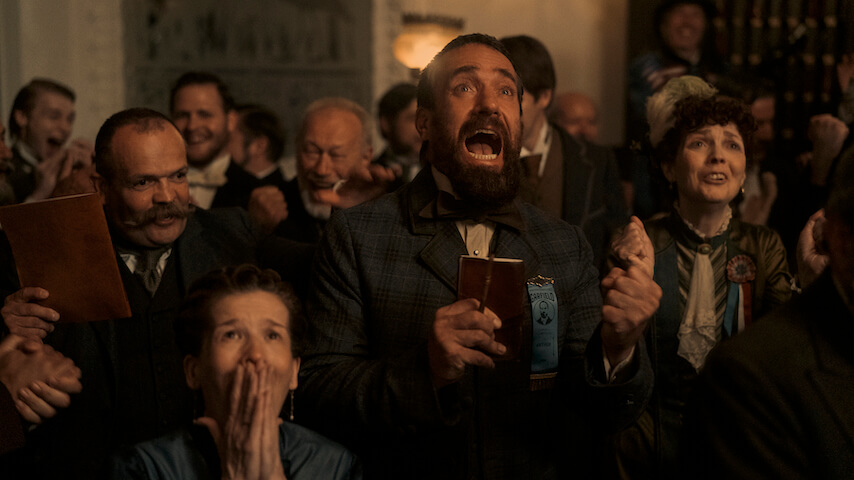Netflix's Death By Lightning is rife with tonal whiplash
Michael Shannon and Matthew Macfadyen star in an overpacked show about James Garfield and his assassin.
Photo: Larry Horricks/Netflix
Pop quiz: Can you name the six men who held the highest office in the land after Abraham Lincoln? Unless you’re an armchair historian, this is probably a stumper. There’s a reason why academics dubbed this dirty half dozen the “forgotten presidents.” Three were pretty ineffectual, one was mired in corruption, one never wanted to be president at all, and one died only six months into his term.
That last mention, James Garfield, is at the center of Netflix’s Death By Lightning, sharing the spotlight with his unhinged assassin, Charles Guiteau. Mike Makowsky’s limited series, based on Candice Millard’s Destiny Of The Republic: A Tale Of Madness, Medicine And The Murder Of A President, chronicles two tumultuous years in U.S. politics. It’s a whopper of a tale that involves, among other things, political infighting, a radical free-love commune, quack doctors, a vengeful mistress, midnight kidnappings, and the invention of the metal detector.
On paper, this all sounds like rich material for a small-screen drama. The thing is, there’s so much material that Death By Lightning can’t decide what to focus on, so it opts for packing as much as possible into its scant four episodes. The result is a meandering saga rife with tonal whiplash. Is it a psychological portrait of a madman? A Conclave-esque political thriller? A gentle family drama? A four-hour Drunk History segment? Yes to all. Thankfully, the series is salvaged by its talented cast, led by Michael Shannon and Matthew Macfadyen.
Our story kicks off in 1880, when Garfield (Shannon), a mild-mannered family man and Civil War hero, heads to the Republican National Convention to decide who will be the GOP’s next presidential candidate. The vote is initially split between James Blaine (Bradley Whitford) and incumbent Ulysses S. Grant (Wayne Brett), but the contest takes a surprise turn after Garfield gives an impassioned speech about the future of the party. Before long, he finds himself at the top of the ticket. And though he easily earns the love of the American people, he stokes the ire of Roscoe Conkling (Shea Whigham), whose ice-cold devotion to the political machine is a stark contrast to Garfield’s essential goodness. While Conkling uses his influence to secure the vice presidency for his hard-drinking crony Chester Arthur (Nick Offerman), Garfield finds an ally in Blaine, whom he names secretary of state.
Garfield also earns a zealous superfan in Guiteau (Macfadyen), a mentally ill grifter who’s determined to worm his way into the president’s inner circle. Since D.C. security was hilariously lax back in the day, it’s all too easy for this weirdo to accost Garfield and the members of his camp, whether he’s crashing the inaugural ball or pleading his case to Arthur as the sloshed veep pukes his guts out in a bathroom stall.








































